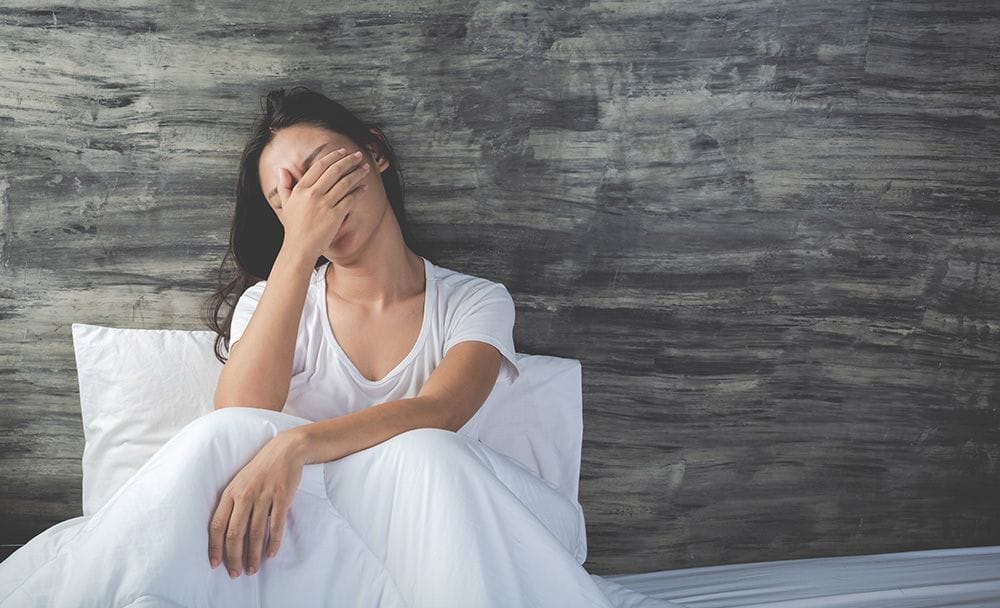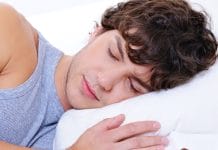
Being able to sleep soundly is an essential aspect of maintaining good health. But there are people to whom sleep does not come easily. The condition of finding it difficult to fall asleep or stay asleep or get good-quality sleep is known as Insomnia. [1] Insomnia meaning refers to a sleep disorder that keeps you awake all night. Insomnia symptoms include:
- Long sleep latency.
- Frequent nighttime awakenings.
- Prolonged hours of wakefulness during the sleeping period.
- Frequent and several transient arousals. [2]
- Irritability and confusion all day long
- Non-restorative sleep [2]
These symptoms of Insomnia show up even if someone has adequate time, the right environment [1], and the circumstances to sleep well. Insomnia can interfere with your day-to-day activities and may make you sleepy and tired all day. [1]
Not sleeping sufficiently can often produce the following daytime consequences:
- Fatigue
- Mood swings
- Poor concentration
- Lack of mental alertness
- Impaired social functioning [3]
- Poor memory
- Proneness to accidents and blunders
- Negative opinion about life in general
- Frequent napping [3]
Types of Insomnia
There are two categories of insomnia:
Short-term insomnia:
Short-term Insomnia is a momentary phase that passes away after a certain period. A traumatic event, stress, or sudden changes in the sleep routine or the environment trigger this type of Insomnia. [1] This type of Insomnia can occur for just a few days and then resolve independently. The stats presented by the application of the DSM-5 criteria states that up to 10 percent to 15 percent of adult people would fall under the category of short-term insomnia sufferers. [3]
Long-term insomnia:
This is a chronic form of insomnia where the issue of sleep deprivation occurs nearly thrice a week or lasts for about a month. [1] This type of Insomnia hits nearly 6% -10% of the population. [4]
Insomnia Causes

As an answer to ‘What is insomnia’, we can say that Insomnia disease is often considered a pathological response [2] and the problem is said to push one into a state of hyper-arousal. Hyper-arousal may be defined as a condition that involves heightened cognitive, cortical, and somatic activation. [3] Also, hyper-regulation of wake-supporting chemicals such as catecholamines, histamine, and hypocretin can lead to insomnia. [3]
When it comes to insomnia causes, certain triggers set the stage for hyper-arousal. Read below:
- Sleep-related conditions such as narcolepsy, sleep terror disorder, sleep apnea, and restless leg syndrome [3]
- Substance abuse
- Jet lag
- Stress, depression, and anxiety [3]
- Medical conditions such as aches and pains, psychiatric disease, etc.
- Medication usage such as steroid medication, epilepsy medication, and antidepressants
- Circadian misalignment [3]
- Over-indulgence in nicotine, alcohol, and caffeine
- Noisy environment
- Uncomfortable sleeping arrangements, such as light, temperature, or bed
- Irregular work shift hours
Gender and Aging too are two predominant risk factors for Insomnia. Aged people have Insomnia probably due to the partial deterioration of the sleep control or management systems [2]. Women are more prone to Insomnia than men, and hormonal fluctuations during menstrual cycles and menopause mainly trigger the problem. [2]
Temporary sleeplessness should not be a cause of worry. But if the issue is chronic and is left untreated, it can lead to unwanted complications such as Type-2 Diabetes, Hypertension, Cardiovascular diseases, and psychiatric problems. [3]
Insomnia Treatment
Insomnia treatment may be categorized into two broad categories, such as:
Non-pharmacologic
Non-pharmacologic treatment is the first line of treatment for insomnia. The non-pharmacological treatments include:
Cognitive therapies
These therapies help the patient understand how their mental state, attitude, and thoughts can impact the sleep cycle, and how things can be changed just by changing the attitude towards sleep.
Sleep restriction therapy
This therapy involves limiting the total amount of the sufferer’s bedtime to the actual net sleeping time. The therapy aims at creating sleep inertia and enhancing sleep efficiency. [3]
Sleep hygiene
Sleep hygiene knowledge empowers the patient to understand how bad habits like frequent daytime napping, alcoholism, smoking, and caffeine intake near bedtime can disrupt the healthy sleep cycle. [3]
Stimulus control
This therapy can help the patient understand the connection between bed and sleep. In this therapy, patients are encouraged to go to bed only when sleepy and not before that. [3]
Pharmacologic
There are plenty of pharmacologic methods to treat insomnia. One may resort to OTC Melatonin pills and even prescription medications for sleep. [3] The hormone Melatonin induces sleep by regulating the circadian rhythm. [3]
Apart from drugs and pills, there are a good number of Ayurvedic herbs that can help you sleep better. As far as Ayurveda is concerned, ‘sleep’ or ‘nidra’ is one of the three pillars of healthy life sustenance. In the Charak Samhita, the importance of sleep in a human being’s life has been discussed. [5] The best sleep-inducing Ayurvedic herbs include:
Brahmi
The sedative effect of Brahmi can tranquilize your brain and make you fall asleep easily. The herb is a perfect natural sedative without any harmful side effects.
Ashwagandha
Ashwagandha is an amazing natural sleep aid. The herb can elongate your sleep duration and improve your sleep quality. [7]
Shankhpushpi
Shankhpushpi has a calming effect and is an insomnia cure for stress-induced insomnia.
Jatamansi
Jatamansi is a rhizome that can be used to initiate sleep. The herb can calm your nervous system and make you fall asleep due to its Nidrajanana attributes. [6]
Vacha
Vacha is a mind-calming herb that can induce sleepiness. It is best to take this herb at bedtime.
Apart from the herbs mentioned above, there are other herbs too that can help you sleep better. Valerian root, Chamomile floral extracts, Lavender and Kava-Kava, are famed enough for their curative power against Insomnia. [3]
An evaluation & diagnosis step precedes these insomnia management strategies. During the evaluation phase, the patient’s sleep history is asked for by the healthcare practitioner. Other evaluation methods include Polysomnography testing, maintaining sleep logs and diaries, and the like. [3]
FAQs
How to cure insomnia with Shirodhara?
Shirodhara is an ancient Ayurvedic practice to calm the nervous system, alleviate stress, and reduce the hyperactivity of the nerves. The therapeutic method of Shirodhara includes the rhythmic pouring of herbs-infused oil onto the forehead of a person who has insomnia. [5]
Which are the best anti-insomnia foods?
You can improve your sleep quality by consuming the following foods before bedtime:*
1. Almonds
2. Cherry juice [8]
3. Walnut
4. Kiwifruit [8]
5. Milk
6. White rice [9]
*The above-listed foods are mostly functional foods and do not belong to the category of Ayurvedic ingredients. Before including any of these foods in your diet, you must consult a nutritionist or dietecian.
How to cure insomnia with lifestyle changes?
Here are the top 5 lifestyle change tips for managing insomnia:
1. Stick to a sleep schedule
2. Do not take caffeine after lunchtime
3. Try to lead an active life
4. Avoid daytime or evening time naps
5. Take a bath before bedtime with Lavender essential oil
Conclusion
You can opt for treatments, therapies, and herbal and natural remedies mentioned here to treat insomnia. These remedies are backed by research and can thus have proven results against the devastating issue of sleeplessness.
Disclaimer
This article is written from a health and wellness perspective and is not medical advice. Kindly seek the help of a certified medical practitioner before initiating any treatment.
References
- What Is Insomnia?
- Insomnia: Definition, Prevalence, Etiology, and Consequences
- Short-term Insomnia
- Advances in the Treatment of Chronic Insomnia: A Narrative Review of New Nonpharmacologic and Pharmacologic Therapies
- Insomnia: A Study on Sleeping Disorder with the Reference of Ayurvedic Herbs
- Central nervous system depressant activity of Jatamansi (Nardostachys jatamansi DC.) rhizome
- Efficacy and Safety of Ashwagandha (Withania somnifera) Root Extract in Insomnia and Anxiety: A Double-blind, Randomized, Placebo-controlled Study
- Strategies of Functional Foods Promote Sleep in Human Being
- Associations between Rice, Noodle, and Bread Intake and Sleep Quality in Japanese Men and Women

















